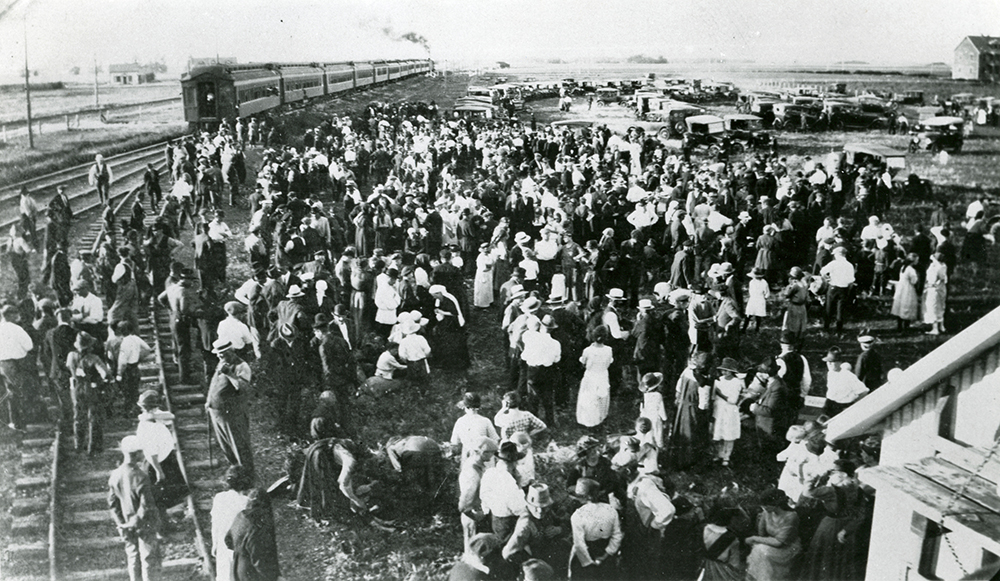To start, a little bit of history.
The Mennonites evolved out of the 16th-century Protestant Reformation. As Anabaptist pacifists who practised adult baptism, they often held themselves apart from the surrounding communities, and in turn often had trouble finding safe havens. They were persecuted by Catholics and Protestants alike, but in this persecution they found strength of conviction.
By the mid-1700s, a large group of Mennonites had settled in Prussia, where they were granted a military exemption by Frederick the Great. His son, Frederick II, intended to end that exemption. Thankfully, at around the same time, Tsarina Catherine the Great of Russia invited the Mennonites to come and settle the large swaths of agricultural land in the area around what is now Ukraine. According to historian Frank Epp, 10,000 Prussian Mennonites moved to Russia in a 60-year period. Both sides of my father’s family were among those numbers.
For almost the next 100 years, Mennonites farmed and prospered. But in 1870, the Tsar began to rescind the Mennonites’ military exemption, and a small group left for the New World. Most stayed behind. During the First World War, most Russian Mennonite men chose alternative service, rather than take up arms. During the Russian Revolution, Mennonites supported the White armies, and as such were made targets by the Red armies and anarchist troops. In particular, Nestor Makhno and his bandits terrorized the Mennonites, raping, robbing and murdering people and destroying villages.
Mennonites found themselves dispossessed. During the ensuing Soviet years of collectivization, Mennonites were marginalized and starved. Those who spoke too loudly of opposition were arrested and disappeared in the Siberian Gulag, never to be heard from again.
My great-grandfather, Peter Warkentin, was a Mennonite minister in the village of Karpowka, in the Memrik settlement in what is now Ukraine. He watched his peers and family members being tortured, killed and taken away.
At around the same time in Canada, David Toews was working to get the federal government, under Tory Prime Minister Arthur Meighen, to lift restrictions concerning Mennonite immigration. Canadians did not trust the pacifist Mennonites. The fact that they were German and Canada had just come through the First World War did not help. When Meighen was replaced by William Lyon Mackenzie King’s Liberal government in 1921, the restrictions were lifted. Eventually, 21,000 German Mennonites from the former Soviet colonies would emigrate to Canada.
My great-grandfather and his family were among the lucky ones. After being questioned in his home about his feelings toward the Soviet government in 1927, Peter, his wife Helena, who was six months pregnant, and the first five of their 10 children fled in the middle of the night. They left with what they could carry. My own grandma, who was four at the time, remembers that her job was to carry the chamber pot. It was a horrible journey.
For years after they got here, the Mennonites and “the English” did not mix. The Canadians did not trust the strange, German group and the Mennonites did not trust their worldly neighbours.
Assimilation did not come easily, especially for the immigrants from the 1870s. In his study called “Group settlements: Ethnic communities in Western Canada,” as quoted in Frank Epp’s Mennonites in Canada, Carl Addington Dawson found that those Mennonites who wanted better farming opportunities went to the United States. Those who wanted “religious liberty at any price” went to Canada.
So the Mennonite communities insisted on keeping their own language and their own religions. They insisted on their own schools and kept to themselves. They refused to swear on the Bible, instead affirming that what they told was the truth. They would not baptize their children. Both Canadian Catholics and Protestants were wary of them.
During the Second World War, the vast majority of Canadian Mennonite men declared themselves conscientious objectors, although some did serve their new country. Still, the community was viewed with mistrust. During the war, my great-grandmother received a photo of her younger brother, Daniel, in the uniform of the German forces he fought and ultimately died for. She hid the picture behind the stove pipe, so afraid someone would see it and report her, and the family would be arrested . . . or worse.
My dad has 61 first cousins. When he and my Anglican mom married in 1972, he was one of the first of those 61 to marry outside the faith. It was “a big thing.”
Today, those “weird German Mennonites” are just another part of Canadian society. Through all of the mistrust, pain and confusion, Mennonites are now proud Canadians. They learned to trust the society around them. They are Cabinet ministers. They are farmers. They are doctors, nurses, lawyers, teachers and social workers. They contribute to the society they are now part of. They melded their history with their present and their future.
Mennonites must do the ‘right thing’
This is part of my origin story. It has been resonating strongly with me lately.
It hums in me when I hear people of Mennonite origin scoff at the idea of Syrian refugees coming to Canada, because when I look at those huddled masses I think to myself, “that was us 100 years ago.”
They, too, are dispossessed.
Like the Mennonites, the Syrians are different. Different religion, different way of doing things, different language. They are also fleeing from people who destroyed their homes and marginalized them, a group whose ideology does not allow for dissent or opposition. They were starved and terrorized. They are desperate. They are afraid.
Like the Mennonites, the Syrians are from a region that Canada has recently been at war with. Like the Mennonites, the Syrians just want a chance to live a safe and free life.
They are us 100 years ago.
“But,” you are saying, “how do we know there aren’t Islamic State members hiding among the refugees? We need to screen them!” And absolutely, we need to do that. But let’s do it here. Let’s bring them over here and then screen them, and anyone who is proven to have a dodgy history, ship them back.
But how can we in good conscience make children wait for safety while we screen the adults in inhumane conditions? My grandma’s family was stopped at Halifax and had to wait there until a sister’s illness got better. But even during the uncertainty of waiting in a strange place, they knew they were safe. Similarly, I know that Mennonites were viewed as Nazi sympathizers during the Second World War. And I’m sure some of them were. It must have been a confusing time for many of them. But they were still given the chance to prove themselves.
“But we’re at war with the Syrians,” you might say. Well, no, we’re not. We were at war in Afghanistan against Muslim extremists. At the moment, we are at war with Islamic State, not Syria. And in case you missed it, most Syrians didn’t exactly roll out the carpet for Islamic State. And if the number of dead Syrians is any indication, the feeling was mutual. As Canadians, we don’t like Islamic State. Neither do the Syrians. Hint: That’s why they’re fleeing. That and the bloody civil war.
For those who have lost friends, as we have, and family at the hands of Islamic extremists, I think you’d be hard pressed to find someone who would be better than the Syrians at commiserating with you. As a Mennonite, I am grateful the Canadian government let those German Mennonites into the country so soon after the war. If they hadn’t, I wouldn’t be here. I wouldn’t exist. Likely, neither would you, fellow Mennonite.
For these reasons, and because this was us 100 years ago, Mennonites need to lobby everyone we can lobby in support of these Syrians. We need to tell our origin stories to all who will listen so that people know that being different is nothing to fear. And while the transition will be difficult, different can become part of our normal. We need to do this, not just because many Mennonites call themselves Christians and this is the Christian thing to do, but because it is the right thing to do. Because we owe our own good fortune, and our existence as Canadians and as humans, to a country that welcomed us in our time of need, even when it wasn’t the popular thing to do.
If you, as an ethnic Mennonite, one who is alive and prosperous in a free country, do not support the Syrian refugees, I don’t understand you. If you don’t think that Syrians don’t deserve the exact same chance as we do, I don’t understand you, and I think you need to take a long, hard look at why you believe this. Ask yourself if you would have let your grandparents or great-grandparents into Canada 100 years ago. If the answer for that is yes but still no for the Syrians, I hope that someday you are forced to answer for that to the ghosts of those who died waiting.
Originally published on Kira Olfert’s Facebook page (on.b.me/1KBsHYR) on Sept. 18.
For discussion
1. When and how did your forebears arrive in Canada? What were their challenges of language, housing and employment? What assistance did they receive in getting settled? How well have these stories of migration been retold and passed on through the generations?
2. Kira Olfert points out similarities between Mennonite immigrants of the 1920s and Syrian refugees today. Do you agree with her analysis? Do these similarities put people of Mennonite origin under an obligation to help other refugees?
3. How do you think Jesus would have responded to refugees? What are some things Jesus said to his followers to encourage them to help others in need? How would you respond if asked why you help others?
4. Has your congregation assisted refugees in the past? What were the joys and the challenges of sponsoring refugees? What should be Canada’s policy toward refugees? What action could your congregation take to help a refugee family today?
—By Barb Draper








Leave a Reply
You must be logged in to post a comment.